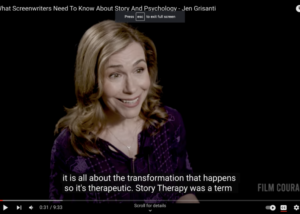Watching what works and why it works in TV is something that is a part of what I do for a living as a Story/Career Consultant for writers. I am always looking for ways to teach story that reflect the brilliant work that is currently being done on TV. I’ve noticed that the shows that draw strong audiences and that I find myself returning to week after week are shows that have strong serialized character arcs within the closed-ended professional arcs. The personal dynamics contribute to the central conflict of the show and create longevity. The audience responds to these character arcs emotionally, and when you touch an audience on an emotional level, like me, they want to return each week.
Shows that successfully utilize this formula include: The Blacklist, The Americans, The Good Wife, Scandal, Masters of Sex, House of Cards, and Ray Donovan, to name a few. People connect with personal struggle. So, if you create story arcs that contain a powerful question within the personal story that you answer by the end while showing the central character in pursuit of the professional arc, you add a depth of emotion and increase the rooting factor.
Connecting to emotional situations is what sets a new series apart from the pack. The key is creating character dynamics that drive the audience to return each week. If there is a strong central conflict in the personal lives of the characters, you increase your chances of ratings success. When there is a strong personal arc within a professional scenario, today’s audiences return week after week to discover more often than not, what happened in the personal situation.
The Good Wife is a strong example. When the show started, we were drawn to Alicia’s plight and the question: How is Alicia going to bring security back to her family after her husband, Peter, goes to jail for his involvment in a sex scandal and illegal activity? The answer came in the character of Will, her old flame that gave her a chance by hiring her to be a lawyer at his firm. The dynamics of the triangle between Alicia, Peter and Will really drew us in by creating questions about Alicia’s ability to be successful as a lawyer as well as what she would do given the opportunity to leave her husband for Will. The writers really knew how to utilize these questions from week to week while exploring legal cases at the firm. The triangle and how Alicia was going to play her role within it was very universal. You had those that rooted for Alicia and Will and others that rooted for Alicia and Peter. With the major change that happened this season, what drew us in was a new question: How will Alicia emotionally respond to what happened and how will this affect her marriage with Peter? When you explore powerful emotional questions between the characters at home while they are in the midst of professional pursuits, you build your audience.
A recent episode of The Blacklist, posed the question, “Did Red kill Liz’s father?” The exploration of this question along with the existing dynamic of their relationship elevates the professional story to a whole new level because we understand the conflict that is going on in their personal relationship. This season, the writers also explored the personal story arc between Liz and her husband, Tom. Red warns her about Tom, but Liz doesn’t listen. Then, when Liz realizes that Red was right about Tom, it opens up a whole new can of worms. Liz’s relationships with Red and Tom provide an emotional core to a show that has a professional goal that usually opens and shuts each week.
In Ray Donovan, you wonder how far Ray will go to keep his father who gets out of prison in the pilot, away from his family. All the familial dysfunction of a broken childhood unravels during the series. We see what fuels Ray in his profession as a “fixer” for his celebrity clients. Ray feels he failed at fixing things in his own home because he didn’t protect his brother from being sexually molested by a priest. His memories of a broken family drive him to fix things for other people through his work. When the writers juxtapose Ray’s desire to “fix” against the demons that he faces in his personal life story, they create a series that draws us in and makes us want to return each week to see what happens.
Masters of Sex gives an inside look at the sexual tension between Masters and Johnson, the pioneers of human sexuality whose research touched off the sexual revolution. Seeing the sexual tension in their own relationship is mesmerizing to watch each week, as they make ground breaking professional strides in the understanding of human sexuality. The show draws us in because we want to see how their personal connection to each other leads to their professional breakthroughs in the area of sex. This show takes place in the 1950s, yet the conflict between the personal and the professional is something that we can all connect with no matter what the time period.
When you give people an inside view of who your characters are and what fuels them to do what they do, you create a connection. Your audience will return each week to experience this connection. In today’s television landscape, the personal arcs in your story are the key to the professional success of your series.






